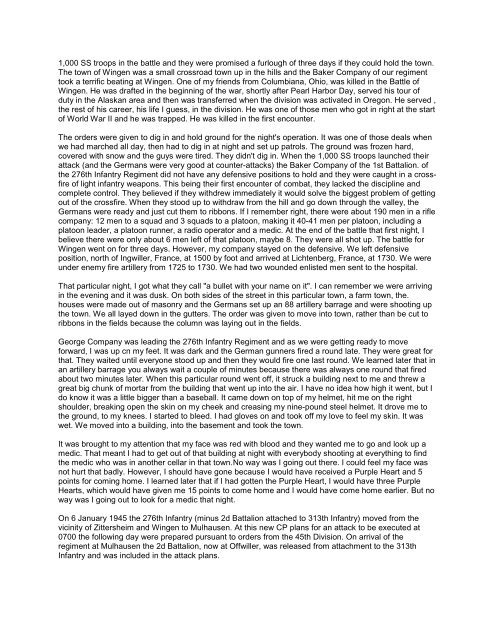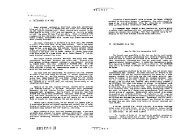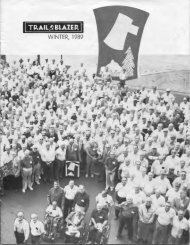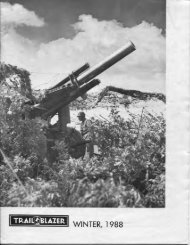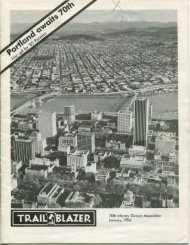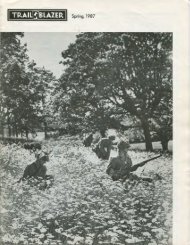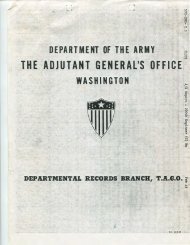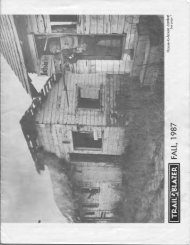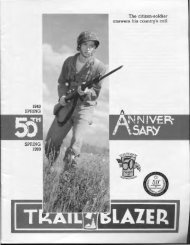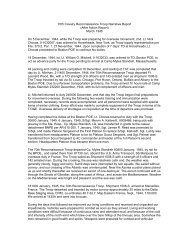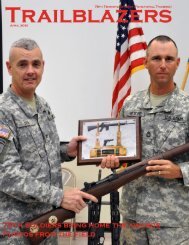Download - 70th Infantry Division Association
Download - 70th Infantry Division Association
Download - 70th Infantry Division Association
You also want an ePaper? Increase the reach of your titles
YUMPU automatically turns print PDFs into web optimized ePapers that Google loves.
1,000 SS troops in the battle and they were promised a furlough of three days if they could hold the town.<br />
The town of Wingen was a small crossroad town up in the hills and the Baker Company of our regiment<br />
took a terrific beating at Wingen. One of my friends from Columbiana, Ohio, was killed in the Battle of<br />
Wingen. He was drafted in the beginning of the war, shortly after Pearl Harbor Day, served his tour of<br />
duty in the Alaskan area and then was transferred when the division was activated in Oregon. He served ,<br />
the rest of his career, his life I guess, in the division. He was one of those men who got in right at the start<br />
of World War II and he was trapped. He was killed in the first encounter.<br />
The orders were given to dig in and hold ground for the night's operation. It was one of those deals when<br />
we had marched all day, then had to dig in at night and set up patrols. The ground was frozen hard,<br />
covered with snow and the guys were tired. They didn't dig in. When the 1,000 SS troops launched their<br />
attack (and the Germans were very good at counter-attacks) the Baker Company of the 1st Battalion. of<br />
the 276th <strong>Infantry</strong> Regiment did not have any defensive positions to hold and they were caught in a crossfire<br />
of light infantry weapons. This being their first encounter of combat, they lacked the discipline and<br />
complete control. They believed if they withdrew immediately it would solve the biggest problem of getting<br />
out of the crossfire. When they stood up to withdraw from the hill and go down through the valley, the<br />
Germans were ready and just cut them to ribbons. If I remember right, there were about 190 men in a rifle<br />
company: 12 men to a squad and 3 squads to a platoon, making it 40-41 men per platoon, including a<br />
platoon leader, a platoon runner, a radio operator and a medic. At the end of the battle that first night, I<br />
believe there were only about 6 men left of that platoon, maybe 8. They were all shot up. The battle for<br />
Wingen went on for three days. However, my company stayed on the defensive. We left defensive<br />
position, north of Ingwiller, France, at 1500 by foot and arrived at Lichtenberg, France, at 1730. We were<br />
under enemy fire artillery from 1725 to 1730. We had two wounded enlisted men sent to the hospital.<br />
That particular night, I got what they call "a bullet with your name on it". I can remember we were arriving<br />
in the evening and it was dusk. On both sides of the street in this particular town, a farm town, the.<br />
houses were made out of masonry and the Germans set up an 88 artillery barrage and were shooting up<br />
the town. We all layed down in the gutters. The order was given to move into town, rather than be cut to<br />
ribbons in the fields because the column was laying out in the fields.<br />
George Company was leading the 276th <strong>Infantry</strong> Regiment and as we were getting ready to move<br />
forward, I was up cn my feet. It was dark and the German gunners fired a round late. They were great for<br />
that. They waited until everyone stood up and then they would fire one last round. We learned later that in<br />
an artillery barrage you always wait a couple of minutes because there was always one round that fired<br />
about two minutes later. When this particular round went off, it struck a building next to me and threw a<br />
great big chunk of mortar from the building that went up into the air. I have no idea how high it went, but I<br />
do know it was a little bigger than a baseball. It came down on top of my helmet, hit me on the right<br />
shoulder, breaking open the skin on my cheek and creasing my nine-pound steel helmet. It drove me to<br />
the ground, to my knees. I started to bleed. I had gloves on and took off my love to feel my skin. It was<br />
wet. We moved into a building, into the basement and took the town.<br />
It was brought to my attention that my face was red with blood and they wanted me to go and look up a<br />
medic. That meant I had to get out of that building at night with everybody shooting at everything to find<br />
the medic who was in another cellar in that town. No way was I going out there. I could feel my face was<br />
not hurt that badly. However, I should have gone because I would have received a Purple Heart and 5<br />
points for coming home. I learned later that if I had gotten the Purple Heart, I would have three Purple<br />
Hearts, which would have given me 15 points to come home and I would have come home earlier. But no<br />
way was I going out to look for a medic that night.<br />
On 6 January 1945 the 276th <strong>Infantry</strong> (minus 2d Battalion attached to 313th <strong>Infantry</strong>) moved from the<br />
vicinity of Zittersheim and Wingen to Mulhausen. At this new CP plans for an attack to be executed at<br />
0700 the following day were prepared pursuant to orders from the 45th <strong>Division</strong>. On arrival of the<br />
regiment at Mulhausen the 2d Battalion, now at Offwiller, was released from attachment to the 313th<br />
<strong>Infantry</strong> and was included in the attack plans.


